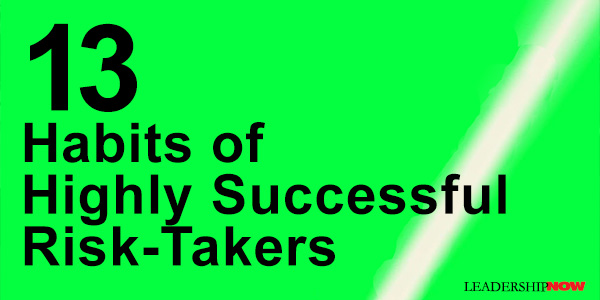13 Habits of Highly Successful Risk-Takers

WE all take risks every day, but some people take it to a whole new level. These people make calculated risks. It requires a different mindset. In One the Edge: The Art of Risking Everything, Nate Silver explains what that entails:
1. Successful risk-takers are cool under pressure. They don’t try to be heroes, but they can execute when the chips are down. It doesn’t matter how well you execute in everyday situations—you’ll never reach the top of your craft if you choke when the pressure is on. Don’t try to be a hero-just do your job.
2. Successful risk-takers have courage. They’re insanely competitive and their attitude is: bring it on.
3. Successful risk-takers have strategic empathy. They put themselves in their opponent’s shoes.
4. Successful risk-takers are process-oriented, not results-oriented. They play the long game. But the long run can take a long time indeed—so in the meantime, we focus on our process.
5. Successful risk-takers take shots. They are explicitly aware of the risks they’re taking—and they’re comfortable with failure. But successful risk-takers are perpetually in search of +EV [expected value] opportunities and willing to pull the trigger. They don’t come along all that often. We probably don’t want everyone in society taking long-shot wagers. But we do want some people willing to risk everything on bets that can have a huge payoff to society.
6. Successful risk-takers take a raise-or-fold attitude toward life. They abhor mediocrity, and they know when to quit. The riskiest course of action is oftentimes just remaining passive.
7. Successful risk-takers are prepared. They make good intuitive decisions because they’re well trained—not because they “wing it.” Training, ironically, is often the best preparation to handle the situations that you don’t train for.
8. Successful risk-takers have selectively high attention to detail. They understand that attention is a scarce resource and think carefully about how to allocate it. The one thing you don’t want is to be consumed by the stakes of the mission; that’s a waste of bandwidth. You need your full attention on where you are and what you can do to help it to ensure it’s going right… and adapt and adjust if it starts to not go right.
9. Successful risk-takers are adaptable. They are good generalists, taking advantage of new opportunities and responding to new threats. As the world gets more complicated, it’s generally the generalists who rule the roost. They are more likely to adapt successfully to the unknown.
10. Successful risk-takers are good estimators. They are Bayesians, comfortable quantifying their intuitions and working with incomplete information. You also have to recognize that—as an outgrowth of Bayes’ theorem, which works by revising your probabilistic beliefs as you collect more information—your estimates will become more precise as you collect more data. But sometimes your edge comes from being willing to act on a relatively crude estimate to take advantage of an opportunity when other people are still mired in the fact-finding stage.
11. Successful risk-takers try to stand out, not fit in. They have independence of mind and purpose.
12. Successful risk-takers are conscientiously contrarian. They have theories about why and when the conventional wisdom is wrong. So be a conscientious contrarian—look for flaws in people’s incentives rather than their intelligence—and then seek out a place where your own incentives are well-aligned with your goals.
13. Successful risk-takers are not driven by money. They live on the edge because it’s their way of life. The physical risk-takers I spoke with also seemed to be motivated by some intrinsic desire to take risk and expressed a kinship with others who feel the same way.

![]()
Posted by Michael McKinney at 10:17 AM
Permalink
| This post is about Problem Solving



